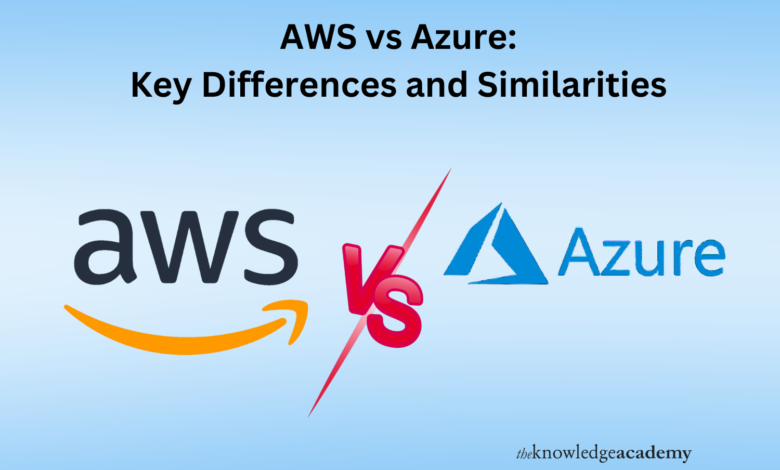AWS vs Azure: Key Differences and Similarities

Companies worldwide are captivated by the competition between Microsoft Azure and Amazon Web Services (AWS) in this age of digital transformation, where cloud computing is in high demand. With their distinct advantages and wide range of services, these cloud titans promise to revolutionise how businesses function, develop, and grow.
This blog will explore the key differences and similarities between AWS vs Azure, helping you decide on your cloud computing needs. Furthermore, understanding these platforms can be significantly beneficial, as mastering AWS Certification Courses and Azure Certification courses can provide a deeper insight into optimising cloud solutions for your business.
Table of Contents
- Overview of AWS and Azure
- Key Differences Between AWS and Azure
- Similarities Between AWS and Azure
- Conclusion
Overview of AWS and Azure
AWS has grown to become the world’s biggest and most popular cloud platform. AWS provides more than 200 feature rich services from data centres across the globe, covering a variety of needs, such as databases, machine learning, artificial intelligence and processing power. AWS is renowned for having a sizable user and partner community, a strong ecosystem and comprehensive documentation.
Microsoft Azure is a strong competitor to AWS. Because Azure easily interacts with Microsoft’s product line, companies that now use Windows Server, Active Directory and other Microsoft technologies may find Azure a compelling option. Cloud computing, analytics, networking, storage and computing are all included in Azure extensive list of services. It is also well known for providing robust support for hybrid cloud settings.
See also: Guide to Pest Control and the Role of Exterminators
Key Differences Between AWS and Azure
Let’s see below how AWS and Azure differ from each other based on key characteristics:
Market Share and Reach
- AWS: In the cloud computing space, AWS has the biggest market share. Its data centres, spread across multiple regions, offer comprehensive geographic coverage and dependability.
- Azure: Azure is a formidable competitor, although its market share is second. However, Azure has a geographical advantage over AWS because it has quickly grown its worldwide presence and provided data centres in additional regions.
Pricing Models
- AWS: AWS pricing might be complicated with distinct price structures for different services. AWS provides pay-as-you-go, spot instances for reduced prices on underutilised capacity, and reserved instances for long-term commitments.
- Azure: Although similarly complicated, Azure’s pricing frequently offers more flexibility with per-minute paying and a more comprehensive selection of options for reserved instances. Azure also provides solutions for cost control so that customers can maximise their expenditures.
Integration with Third-Party Tools
- AWS: Finding appropriate tools and services is simple because of AWS’s extensive marketplace and multiple third-party connectors. Its open ecosystem makes interaction with a wide range of applications accessible.
- Azure: Azure provides a seamless user experience within the Microsoft ecosystem by integrating Microsoft products and services incredibly effectively. Although Azure works well with third-party tools, it performs best in settings where Windows-based programs are used.
Hybrid Cloud Capabilities
- AWS: AWS offers hybrid cloud solutions by providing services like AWS Outposts, which expand AWS infrastructure into on-premises environments. On the other hand, Azure hybrid services are more closely integrated than AWS’s.
- Azure: Azure is well known for its powerful hybrid cloud features, especially about Azure Stack, which enables companies to use Azure services locally because of this Azure is a top option for businesses wishing to integrate their cloud and on premises systems seamlessly.
Compliance and Security
- AWS: It is appropriate for sectors with strict regulatory requirements because it provides comprehensive security and compliance certifications and offers a wide range of security features and tools to help safeguard apps and data.
- Azure: Azure satisfies numerous global and sector-specific compliance requirements. Azure’s robust security features are well-suited for enterprise contexts, partly because of Microsoft’s extensive experience with enterprise security.
Similarities Between AWS and Azure
Let’s analyse the similarities below as AWS and Azure provide a basic range of cloud services such as networking, virtual machines, storage and databases:
Flexibility and Scalability
Both platforms offer various price options and the capacity to accommodate a range of workloads, allowing them to grow with their users demands. AWS and Azure offer the infrastructure and technologies you need, whether you need to scale down during off peak hours or swiftly expand during peak hours.
Worldwide Reach
AWS and Azure have a global footprint with their data centres spread across several geographical areas. By doing this, low latency, high availability and adherence to regional data residency regulations are guaranteed.
Artificial Intelligence and Machine Learning
Businesses can create intelligent apps, thanks to the advanced AI and machine learning services provided by AWS and Azure. Azure offers Azure Machine Learning and Cognitive Services, while AWS provides services like Amazon SageMaker.
Developer Tools and DevOps
Both platforms support Numerous DevOps techniques and developer tools. Azure offers Azure DevOps and Azure Pipelines, which facilitate continuous integration and continuous delivery, while AWS provides services like AWS CodePipeline and AWS CodeBuild.
Conclusion
Several variables such as your budget, current infrastructure and unique business requirements, influence the decision between AWS and Azure. With a more extensive selection of services and market share, AWS is an excellent option for startups and businesses looking for a complete cloud solution. However, Azure is an excellent choice for companies and organisations already invested in the Microsoft ecosystem because of its comprehensive hybrid cloud features and easy interaction with Microsoft products.
For more information, visit The Knowledge Academy.





